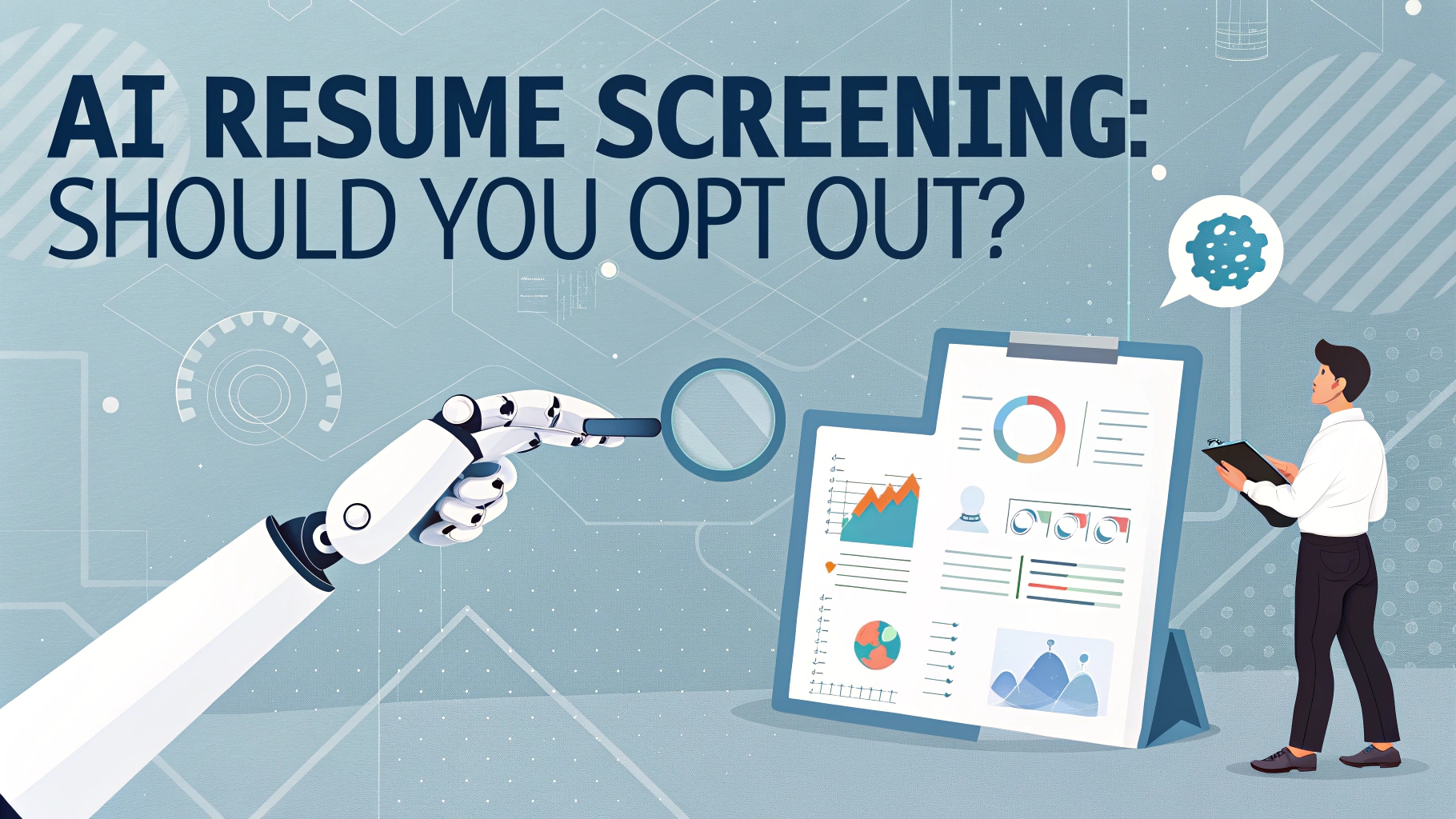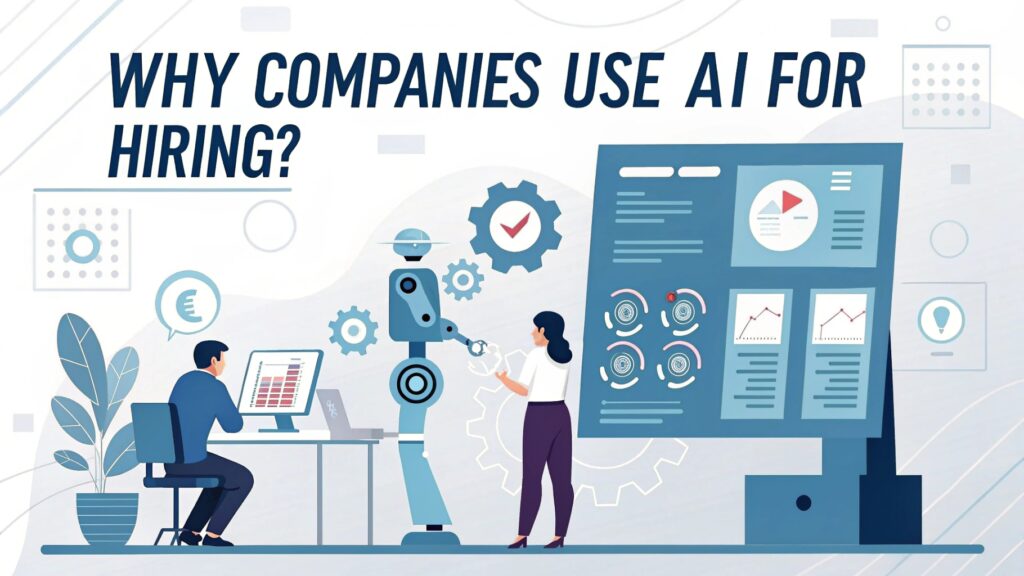AI Resume Screening: Should You Opt Out?

As you polish your resume and apply for your next role, you may encounter a new question: “I wish to opt out from having my resume reviewed by artificial intelligence.”
With AI becoming a standard part of the hiring process for a vast majority of companies, deciding whether to consent to an AI review is a significant choice.
This brings up the critical question for modern job seekers: AI Resume Screening: Should You Opt Out? While the idea of a human-only review sounds appealing, especially for those with unconventional career paths, opting out might mean your application is delayed or even completely excluded from consideration.
This article explores the complexities of AI resume screening, weighing the potential benefits of opting out against the risks, and providing strategies to navigate this new era of recruitment.
What is AI Resume Screening?
AI resume screening is the use of artificial intelligence and machine learning to analyze and filter job applications. These systems go beyond simple keyword matching used by older Applicant Tracking Systems (ATS).
Modern AI tools can parse resume content, identify skills and experience, and rank candidates based on their alignment with the job description. By 2025, it’s projected that 83% of companies will use AI to review resumes.
These technologies are designed to make the initial stages of recruitment more efficient by handling large volumes of applications quickly.
The primary function of AI in this context is to create a shortlist of the most qualified candidates for human recruiters to review. The AI assigns a score to each resume based on its relevance to the role, but it typically doesn’t make the final hiring decision.
This automation helps companies manage the high number of applications they receive, especially with the rise of remote work.
Why Companies Use AI for Hiring?
Employers adopt AI screening tools for several key reasons, primarily centered around efficiency and consistency. The technology can significantly reduce the time and cost associated with hiring.

Here are some of the main drivers for companies using AI in recruitment:
- Speed and Efficiency: AI can screen hundreds or even thousands of resumes in the time it would take a human to go through a small fraction. This drastically reduces the time-to-hire.
- Cost Savings: By automating the initial screening, companies can lower their recruitment expenses.
- Handling High Volume: For popular job postings that attract a massive number of applicants, AI is an essential tool for managing the workload.
- Improved Candidate Matching: Proponents argue that AI can precisely match a candidate’s qualifications to the job description, leading to a higher quality shortlist.
- Reducing Human Bias: In theory, AI systems can offer a more objective evaluation by focusing on skills and qualifications, thereby reducing the impact of unconscious human bias.
AI Resume Screening: Is Opting Out Right for You?
Deciding whether to opt out of AI resume screening isn’t a simple yes-or-no question. The right choice often depends on your individual career path, the industry you’re in, and the specific role you’re targeting.
While the option to opt out provides a sense of control, it’s important to understand the potential consequences.
The Case for Opting Out: When a Human Review is Better
For some candidates, bypassing the algorithm and getting their resume directly in front of a human reviewer can be advantageous. Here are situations where opting out might be the better choice:
Opting out can be beneficial if your background requires a more nuanced interpretation that an algorithm might miss.
- Non-Linear Career Paths: If you have gaps in your employment history, have switched industries, or have a portfolio of freelance work, a human is more likely to understand the context and value of your experience.
- Creative or Niche Roles: For fields like design, marketing, or writing, where a creative portfolio or unique project experience is crucial, an AI might not be able to properly assess your qualifications. A human reviewer can better appreciate a creative resume format that an AI might struggle to parse.
- When Transferable Skills are Key: Career changers often rely on showcasing transferable skills. An AI, with its rigid focus on keyword matching, may overlook the relevance of these skills.
- Concerns About AI Bias: AI systems are only as unbiased as the data they are trained on. If an algorithm has been trained on historical hiring data that contains biases, it may perpetuate them, potentially filtering out qualified candidates from underrepresented groups.
The Risks of Opting Out: Potential Downsides
While opting out may seem like a way to get a fairer assessment, it comes with significant risks that could harm your job search.
Declining AI screening could lead to your application being sidelined or completely ignored, as many companies rely heavily on these automated systems.
- Application Exclusion: In many large organizations, the recruitment process is built around AI. Opting out might mean your application is sent to a separate, less-monitored queue, or worse, not reviewed at all.
- Significant Delays: Human reviews are inherently slower. While other applications are being processed quickly by AI, yours could be sitting in a backlog.
- Missed Opportunities: AI can sometimes identify other suitable roles within a company that you may not have applied for but are a good match for your skills.
- The Reality of the “Opt-Out”: In some cases, the opt-out option is more of a legal disclosure that AI is being used rather than a guarantee of a human-only review process.
Crack the Code: Thrive in the Era of AI Resume Screening
Instead of simply opting out, a more effective strategy for most job seekers is to learn how to optimize their resume for AI screeners. This approach allows you to work with the system to increase your chances of getting noticed.
Optimizing Your Resume for AI
Here are key strategies to make your resume more AI-friendly:
- Tailor with Keywords: Carefully read the job description and incorporate relevant keywords and phrases naturally throughout your resume. Use the exact job title and terminology mentioned in the posting.
- Use a Simple Format: Avoid complex formatting, graphics, tables, and columns, as many AI systems struggle to parse them correctly. Stick to standard fonts and a clean, chronological layout.
- Standardize Job Titles: If your company uses unconventional internal titles, translate them to their standard industry equivalents on your resume.
- Include a Skills Section: A dedicated skills section with a mix of hard and soft skills makes it easy for AI to identify your qualifications.
- Use Full Acronyms and Titles: Write out both the acronym and the full title to ensure the AI catches it (e.g., “Master of Business Administration (MBA)”).
The Power of Networking
Even with a perfectly optimized resume, the most effective way to bypass AI screening is often through networking. A direct referral from a current employee can get your resume straight to the hiring manager, skipping the initial automated filter entirely.
Reach out to recruiters and professionals at your target companies on platforms like LinkedIn to build connections.
The Future of AI in Recruitment
The use of AI in hiring is only expected to grow. Statistics show that a large majority of companies are already using AI in their recruitment process and have seen significant improvements in efficiency. As the technology evolves, it will likely become more sophisticated at understanding context and reducing bias.
However, concerns about transparency and fairness remain. Some jurisdictions, like New York City, have enacted laws requiring employers to disclose their use of AI in hiring and conduct bias audits. This trend towards greater accountability may help address some of the current shortcomings of these systems.
Conclusion
So, when faced with the choice, what should you do? For most job seekers applying to large companies, the risks of opting out of AI resume screening often outweigh the benefits. The reality is that in today’s high-volume job market, AI is a necessary tool for many employers.
Instead of avoiding it, the smarter strategy is to adapt by optimizing your resume for these systems. Ultimately, the debate over AI Resume Screening: Should You Opt Out? highlights a broader shift in recruitment.
While AI offers efficiency, the human element remains vital for assessing a candidate’s full potential. By understanding how AI works and focusing on a dual strategy of resume optimization and genuine networking, you can navigate the modern hiring landscape and increase your chances of landing your desired role.






